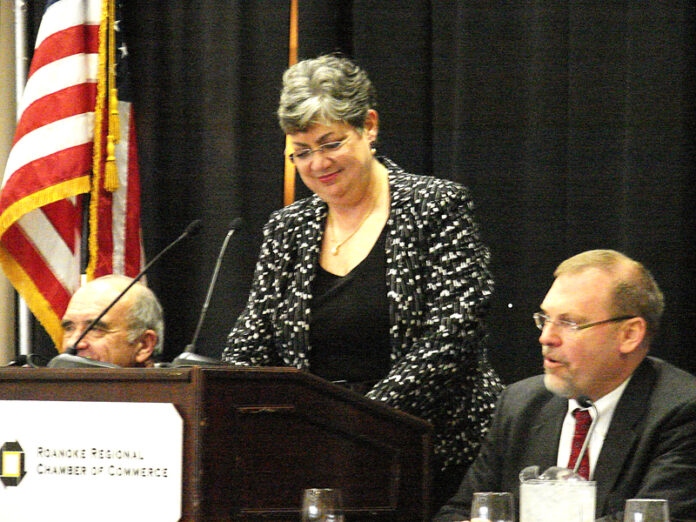
Tough decisions, a bleak economic outlook, and political party distinctions were all part of the Chamber of Commerce 2010 Annual Legislative Wrap-up breakfast at the Airport Holiday Inn Thursday. The question and answer period drew competing visions between the Democratic and Republican representatives in attendance.
Bill Cleaveland (R-17), who is serving his first term, quoted 49-year Bedford delegate Lacy Putney; “I’ve never seen it like this before.” Cleaveland said “everyone is taking a hit.” He wants to see government reform so Virginia will be poised for the inevitable economic rebound.
Transportation funding was the luck of the draw for delegate Charles Poindexter (R-9) of Glade Hill. “Transportation needs a long-term vision with natural gas and hydrogen vehicles,” said Poindexter. He added that the successful offshore drilling bill needs to be backed up by assurances that Virginia will get the same royalties that Louisiana garners from the Gulf of Mexico.
Delegate Onzlee Ware (D-11) of Roanoke also supported the offshore drilling bill. Ware said “that everybody’s business in here knows that [transportation] is an integral part of doing business.” Ware was not opposed to tolls and believes that eventually all Virginians will realize that government needs to generate additional revenue to fund core services.
Regarding privatizing rest stops, Senator John Edwards (D-21) said, “There is no reason that can’t be done.” Edwards pointed out that commerce develops naturally at interstate highway interchanges.
Senator Ralph Smith (R-22) spoke about starting his business in 1966 when there was no sales tax. He is in favor of raising the fuel tax only if it is offset by efficiencies.
Responding to a question about increasing the state sales tax, Smith opined that just another penny will “begin a rationale for the next one… you go on and on…until government is providing everything.” Ware countered, saying that no politician wants to run on raising taxes but rhetorically asked, “Who suffers if I do or don’t do something?” Ware favors increasing the state sales tax.
Edwards winced, suggesting localities could raise the real estate tax while acknowledging its unpopularity. He and Ware both favor Roanoke City’s proposed 2% meals tax for education that would sunset in two years. Edwards would support a regional sales tax as well. Poindexter said that his constituents were against any tax increase 7 to 1.
Cleaveland believes there are other important core issues besides education that need attention, saying, “We can’t patchwork this stuff on one hot item that comes up at one time.” He would not look at any tax increase until citizens were assured they were getting their money’s worth now.
Following the meeting, Joyce Waugh, President of the Roanoke Chamber of Commerce, took the position that priorities should be set and every other alternative looked at before raising taxes. Waugh remarked on how different each legislator’s opinions were when it came to a municipality’s right to consider any broader forms of taxation.
Commenting on the temporary 2% meals tax, Waugh admitted that “this was one of those odd times when [the Chamber] didn’t take a position … but would prefer there not be a particular industry put upon for that purpose.” She thought that long-term the hospitality industry’s ability to attract conferences and groups would be harmed.
There may be two special sessions called by Governor McDonnell this year — one focused on transportation and another on government structure.
By Valerie Garner [email protected]

